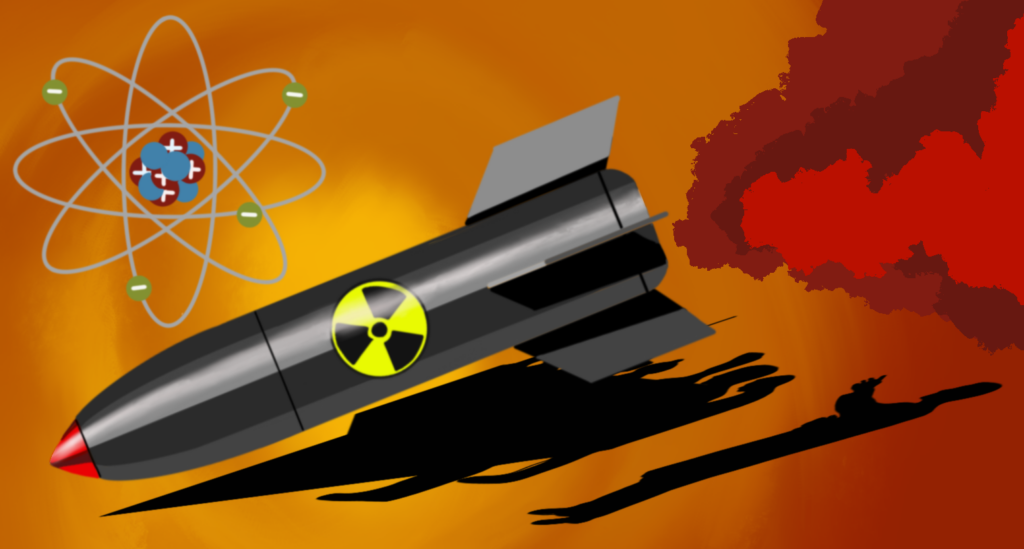Nuclear weapons might seem to be a purely political issue at first glance. Some scientists, however, are calling on their colleagues to join the conversation.
In her March 21 talk at Georgetown University titled “The Growing Danger of Nuclear Weapons (and How Physicists Can Help Reduce It),” Laura Grego, Ph.D., senior scientist and the research director of the Global Security Program at the Union of Concerned Scientists and steering committee member of the Physicists Coalition for Nuclear Threat Reduction, said physicists must be involved in the conversation around nuclear weapons.

“The danger posed by nuclear weapons is serious and never went away. In fact, the danger they pose is probably increasing,” Grego said at the event. “In the past, individual physicists and the physics community have played key roles in reducing the nuclear threat. We need to be doing this again, today.”
The call for scientists to be aware and involved in nuclear weapons policy goes all the way back to 1955. In a joint letter that included Albert Einstein, scientists called for their colleagues to work together to advocate for a peaceful resolution to international conflicts.
Grego’s talk was a collaboration between the department of physics and the Science Policy Interest Group, a graduate student organization within the physics department that meets to discuss the intersection of science and policy.
Grego said she hopes to encourage modern-day scientists to continue the advocacy work of previous scientists.
“Scientists have played important roles in warning about fallout from atmospheric nuclear tests and showing that missile defenses were not a solution to nuclear-armed ICBMs, for example, and have been engaged in advocacy since the first nuclear test,” Grego wrote in an email to The Hoya.
Ryan Nesselrodt (GRD ’22), who leads the Science Policy Interest Group, said it is important for scientists to be involved in political discussions to reduce the number of nuclear weapons around the world. The development of nuclear weapons was a result of a physicist’s work, making it a clear example of the impact physics can have in the world, Nesselrodt explained.
“Scientific discoveries translate into technologies and in the policies, and I think that we should remain engaged in the process throughout that,” Nesselrodt said in an interview with The Hoya.
While nuclear war may be out of the minds for many, conflicts worldwide, including the Russia-Ukraine war that began in February 2022, have reignited some of these worries.
“One of the ways we have invented to constrain these dangers has been arms control, including treaties. The Ukraine war has the potential of bringing nuclear-armed adversaries into direct conflict, and tensions in East Asia and Southeast Asia also provide avenues for crises to spiral out of control between nuclear-armed adversaries,” Grego wrote in an email to The Hoya.
Grego and Nesselrodt both hope that engaging in this dialogue will encourage scientists to think about the impact that their work may have in the world.
“I hope that it would inspire people to understand that the things we’re learning about in the classroom and the things that we do in the laboratory are direct and significant,” Nesselrodt said.
There are still many ways for non-scientists to be involved in advocating for a reduction in nuclear weapons.
“There are a number of great organizations that organize people to advocate for commonsense policies to lower the risks posed by nuclear weapons, including mine, the Union of Concerned Scientists,” Grego wrote. “There are straightforward policy changes that can also make us safer, such as enacting a U.S. policy to never use nuclear weapons first. Policymakers tell me that they rarely hear from constituents on nuclear weapons issues, so your voice counts.”
Grego said she hopes her talk resonates with the younger scientists in attendance, emphasizing that the nuclear weapons issue is a modern-day issue.
“I’m also worried that people younger than me (I’m Gen X) haven’t had the same experience growing up in the Cold War’s shadow when nuclear weapons was an issue that everyone knew about,” Grego wrote. “They are inheriting a dangerous system that they will be responsible for.”








